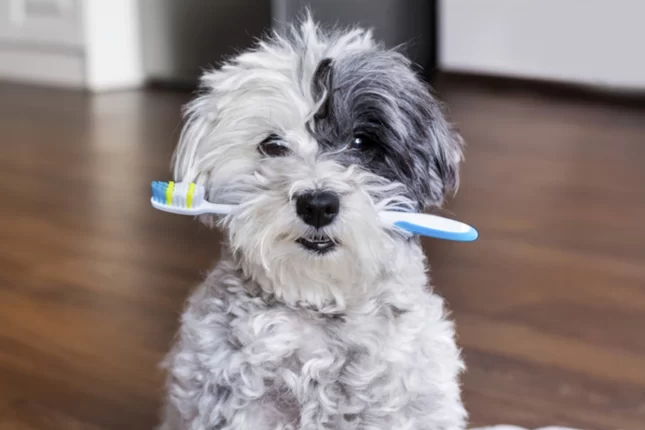The Importance of Pet Dental Health
As a pet owner, you want your furry friend to be healthy and happy, but did you know that dental health plays a huge role in their overall well-being? I’ve often overlooked the importance of my pet’s teeth, but after noticing signs of poor dental hygiene like bad breath and yellowing teeth, I decided to dig deeper. Dental health in pets, just like in humans, can significantly impact their quality of life. A poor dental care routine can lead to gum disease, tooth loss, and even affect other organs like the heart and kidneys.
Common Dental Issues in Pets
Just like us, pets are prone to dental problems. For dogs and cats, common issues include tartar buildup, gum disease, and tooth decay. These problems often go unnoticed until they start causing more severe health issues. In fact, studies show that by the time pets reach three years old, over 80% of dogs and 70% of cats have some form of dental disease. The good news is that you can help prevent these issues by taking care of your pet’s teeth, and one of the most effective ways to do so is through their diet.
How Diet Affects Your Pet’s Dental Health
1. The Role of Nutrition in Oral Health
Just as a healthy diet helps keep our bodies in top shape, the right food can also support your pet’s oral health. In fact, what your pet eats can directly influence their teeth and gums. Foods that are rich in antioxidants, vitamins, and minerals contribute to healthy gums and teeth by reducing inflammation and promoting strong enamel. For example, foods that contain omega-3 fatty acids help reduce inflammation and keep the gums healthy, while calcium and phosphorus are essential for strong teeth.
2. The Best Foods for Healthy Teeth
When it comes to choosing the right food for your pet’s dental health, look for those specifically designed to support oral care. Many pet food brands offer dental-specific diets that contain ingredients designed to reduce plaque buildup and maintain oral hygiene. These foods typically have larger kibble sizes, which encourage chewing, and some even include special ingredients like added enzymes or abrasives to help clean teeth naturally as your pet chews.
If you feed your dog or cat dry kibble, this can also be beneficial for their dental health. The crunching action helps remove plaque and tartar from their teeth. However, it's important to note that kibble alone won't be enough for optimal dental health, and it's essential to supplement it with other dental care strategies.
3. Avoiding Sugary and Starchy Foods
Just like in humans, sugary and starchy foods can contribute to the growth of bacteria in your pet’s mouth, which can lead to plaque buildup and gum disease. For pets, it's crucial to avoid foods that are high in sugar, as these can exacerbate dental issues. Always check the ingredients in pet treats and food, and steer clear of anything that could contribute to tooth decay. Opt for natural, low-sugar options instead.
Pet Dental Treats and Chews
1. Special Dental Chews
Dental chews are a fantastic way to help keep your pet's teeth clean between regular brushing sessions. These chews are specially designed to scrub your pet’s teeth as they chew. Many of them are textured to help break down plaque and tartar. Some treats also contain ingredients like chlorophyll or other natural breath fresheners to help combat bad breath.
While dental chews can be a helpful addition to your pet’s oral care routine, they should never replace regular tooth brushing. Think of them as an additional tool to keep your pet's teeth healthy and fresh between cleanings.
2. Raw Bones and Chewing Toys
Raw bones are another great option for pets who enjoy chewing. Not only do they help scrape plaque from your pet’s teeth, but they also satisfy your pet's natural chewing instincts. Just be sure to supervise your pet while they're chewing on bones to ensure they don't accidentally break their teeth or swallow large chunks. Chewing toys specifically designed for dental health can also work wonders, as they gently massage the gums and help clean teeth. Be sure to choose high-quality, non-toxic toys that are safe for your pet to chew on.
Regular Veterinary Checkups for Dental Health
1. The Importance of Professional Cleanings
Even with a great diet and regular at-home care, pets still need professional dental cleanings. I learned this the hard way after noticing that my dog’s teeth had a significant amount of tartar buildup despite brushing them regularly. Regular checkups with your veterinarian are essential for monitoring your pet’s dental health and catching any potential issues early on. Professional cleanings are typically recommended once a year, depending on your pet’s dental needs. Your vet can also provide guidance on brushing techniques and other ways to improve your pet’s dental care routine.
2. Early Detection of Dental Problems
By regularly visiting the vet, you ensure that any dental problems are caught before they become serious. Vets can spot early signs of gum disease, tooth decay, or other issues that might not be visible to the untrained eye. Catching these issues early allows for less invasive treatments and can help prevent costly dental procedures down the line.
How to Brush Your Pet’s Teeth
1. Choosing the Right Toothbrush and Toothpaste
One of the most effective ways to maintain your pet's dental health is by brushing their teeth regularly. I’ve found that using a toothbrush and toothpaste designed specifically for pets works wonders. Human toothpaste can be harmful to pets, so always choose pet-safe products. There are different types of toothbrushes available, including finger brushes, which are great for pets who are skittish about having a brush in their mouth.
2. Establishing a Routine
Brushing your pet’s teeth may sound like a daunting task, but with patience, it can become part of your routine. Start slow, using positive reinforcement to make the experience enjoyable. Gradually increase the amount of time you spend brushing your pet’s teeth until they are comfortable with the process. Aim for brushing your pet’s teeth at least two to three times a week, if not daily, for optimal results.
Final Thoughts on Pet Dental Health
Maintaining your pet's dental health through diet and regular care can lead to a longer, healthier life for your furry friend. By feeding them a well-balanced, dental-friendly diet, providing appropriate dental chews, and brushing their teeth regularly, you can keep their smile bright and their mouth healthy. Remember, just like humans, pets need consistent care to prevent dental problems. Take action today, and your pet will thank you with their wagging tail and bright, healthy smile!












